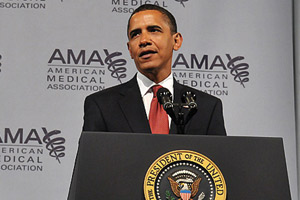Andy Kroll had a good piece on the front page yesterday explaining the problems that America’s looming shortage of non-specialty doctors could cause for health care reform. Here’s the gist:
If primary-care medicine in the US were a patient, its diagnosis would be grim. The first responders to illness and pain, who can spot and treat chronic conditions in their early stages, primary-care doctors are in greater demand each year. In 2006, just more than 250,000 primary-care doctors practiced in the US—by some estimates, that was about several thousand to more than 7,000 less than the demand. The Association of American Medical Colleges projects that by 2025 the demand for primary-care doctors will have soared to nearly 320,000 doctors nationwide, a 29 percent increase from 2006 and the most for all types of physicians.
Andy explains that “part of this supply problem is financial”—primary care docs make much less money than specialists. Do you know why that is? After all, basic economics should tell you the opposite—if primary care doctors really are in short supply, they could charge more, and they would make more. Except that the American health care delivery system is not a free market. Far from it. It’s a system dominated by a single payer—government spending on Medicare and Medicaid—that hugely affects prices throughout the system. The amount that Medicare and Medicaid pay has a huge effect on doctors’ bottom lines. And Medicare and Medicaid don’t pay based on results. They don’t pay based on supply and demand. They pay based on how “hard” a procedure is. Slate health care columnist Darshak Sanghavi explained how this works last month:
Here’s how it works. Doctors do a job—like placing a coronary artery stent, reading an EKG, or spending an hour examining and diagnosing a patient with a complex problem like insomnia—and earn something called “relative value units.” In 2009, according to Medicare, the stent guy scores about 24 units for his relatively quick procedure, the EKG person gets 0.5 units for the 10 seconds his job requires, and the poor internist gets only 2.5 units for his hour of time. Figuring a doctor’s total take per task is straightforward: Medicare adds up a doctor’s total RVUs, multiplies the total by a fixed amount (roughly $40 right now), and writes the check.
Take a quick moment to think about how insane this is. Better yet, let The Economist‘s excellent-but-anonymous Democracy in America blog explain it to you exactly how insane it is:
We have a name for setting prices this way. It’s called the “labour theory of value”, and it was invented by a guy named Karl Marx. It is generally held by modern economists to be a metaphysical concept rather than one that should have any bearing on how prices are set. The reason is that if people are automatically paid according to how hard their work is, they will go about working very hard at tasks that are utterly useless to anyone else. You know what medical procedure would be really difficult to perform? A laser colonoscopy through stoma with control of bleeding—while doing a backflip! Imagine how many work RVUs that would be worth! But we don’t want our doctors doing backflips, and we don’t want them performing the most difficult possible procedures unless those procedures actually make the patient healthier. Wages are supposed to be set partly by demand.
Indeed. But here’s the kicker. Demand doesn’t set health care wages. Guess who does? You guessed it: doctors! An American Medical Association committee makes recommendations to Medicare, and Medicare accepts pretty much all of them [PDF]. It gets better. There are 29 members of the AMA’s Relative Value Scale Update Committee. Twenty-three of them are specialists. You can probably figure out what happens in that committee: the procedures performed by specialists get increasingly “valuable” in relation to primary care services. So the next time a specialist doctor comes whining to you about how she couldn’t make any money in primary care, make sure you explain to her that it’s her colleagues’ fault. And don’t let any doctors yell at you about “socialism.” The labor theory of value seems to suit most of them just fine.














